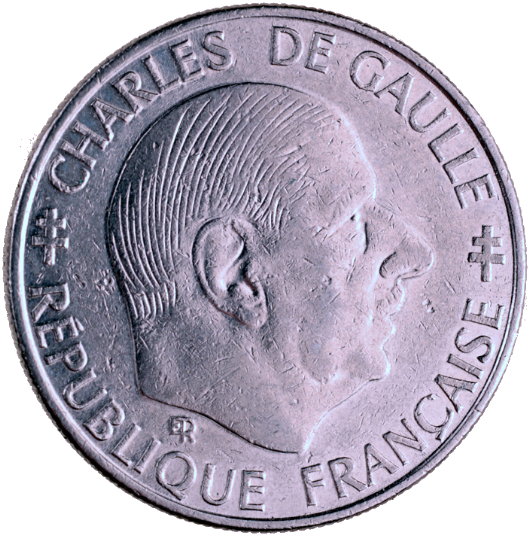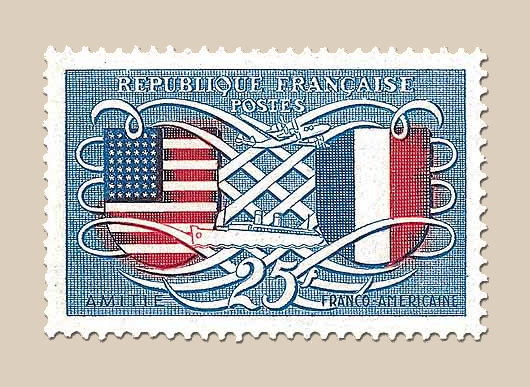France
About Andrew Cusack
 Writer, web designer, etc.; born in New York; educated in Argentina, Scotland, and South Africa; now based in London.
Writer, web designer, etc.; born in New York; educated in Argentina, Scotland, and South Africa; now based in London. read more
News
Blogs
Reviews & Periodicals
Arts & Design
World
France
Mitteleuropa
Knickerbockers
Argentina
The Levant
Africa
Cape of Good Hope
Netherlands
Scandinavia
Québec
India
Muscovy
Germany
Academica
Philippe Séguin
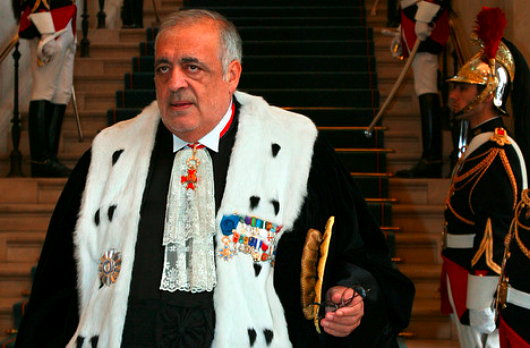
If you can possibly ignore its blood-soaked foundation and its disregard for the freedom of the Church, one can appreciate that the French Republic does republicanism with a dash of pizzazz, as evidenced by the late Philippe Séguin’s official robes as President of the Cour des comptes. Of course, most of this panache it inherited from its intermittent monarchic and (even more so) imperial past. It also inherited from Louis XIV an ever-present spirit of centralisation — the Republic frowns upon the principle of subsidiarity.
Monsieur Séguin was a decent sort. (more…)
Chartres MMX
The Pentecost Paris-Chartres Pilgrimage 2010
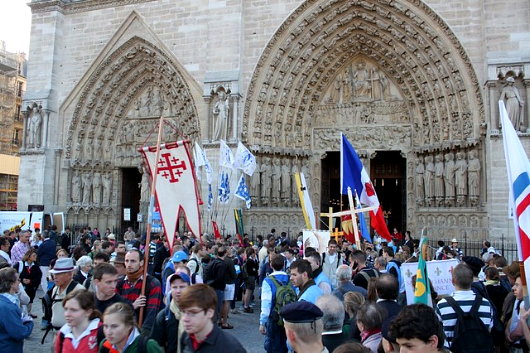
PENTECOST commemorates the descent of the Holy Spirit, often considered the birthday of the Church. Each year, this great feast of the Church is marked by the pilgrimage from the Cathedral of Notre-Dame de Paris on the Île de la Cité (above) to Notre-Dame de Chartres in the Orléanais by pilgrims young and old devoted to the traditional form of the Latin rite. The pilgrimage, often a feast of flags and banners, takes three days beginning on the Saturday of Pentecost weekend, continuing through the great feast itself, and arriving in Chartres on Pentecost Monday (which is still a public holiday in France). This year, Cardinal Vingt-Trois, the Archbishop of Paris, graciously led Benediction on the second day of the pilgrimage, and met with and blessed individual pilgrims. (more…)
Films Recently Watched
In reverse chronological order, from the most recently viewed backwards.
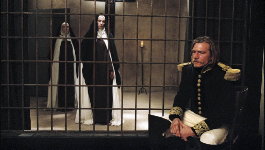
|
Ne touchez pas la hache (2007, France) — Based on Balzac’s La Duchesse de Langeais. I think we need more films set in Restoration France, but this one often fell flat. |
 |
Män som hatar kvinnor (2009, Sweden) — A journalist has six months to investigate the strange murder of a girl from the island estate of a prominent family. A very good mystery, though I had to fast-forward multiple times due to graphicness. Released in the U.S. as ‘The Girl With the Dragon Tattoo’ instead of ‘Men Who Hate Women’. |
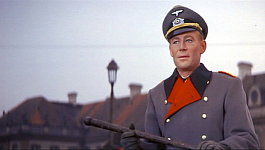
|
The Night of the Generals (1967, Great Britain-France) — A quality production depicting the quest of a German officer to obtain justice in arresting a sociopathic general for the murder of a Polish prostitute. Omar Sharif, Peter O’Toole, Philippe Noiret, Christopher Plummer, Charles Gray, and Tom Courtenay. |

|
Three Days of the Condor (1975, U.S.A.) — A literary analyst at a CIA front organisation returns to the office from lunch to find all his colleagues shot dead. Robert Redford and Max von Sydow. |

|
Le combat dans l’île (1962, France) — A right-wing extremist thinks he’s assassinated a prominent left-wing extremist but soon finds not all is as it appears. Romy Schneider plays the woman caught between the would-be murderer and his typographer friend. |

|
À bout de souffle (1960, France) — A rather lame romanticisation of a cop-murderer and his exploits from Jean-Luc Godard. Paris in the 1950s looks great though. |

|
Defence of the Realm (1985, Great Britain) — A newspaper exposes a Member of Parliament as a potential spy, but it turns out the story is much more complicated than first appearances would have it. Starring Gabriel Byrne, Ian Bannen, Greta Scacchi, Denholm Elliott, Bill Paterson, and Robbie Coltrane. |

|
A Few Days in September (2006, France) — An intriguing spy drama set in the days leading up to September 11th, a French spy (Juliette Binoche) is minding the grown children of an old ex-C.I.A. agent (Nick Nolte) pursued by a psychotic assasin (John Torturro). |
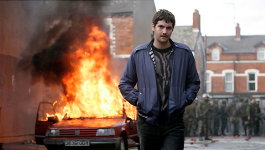
|
50 Dead Men Walking (2008, Great Britain-U.S.A.-Canada) — Based on the story of terrorist-turned-informer Martin McGartland, with Ben Kingsley playing his RUC handler. |

|
The Red Baron (2008, Germany) — A very light handling of an interesting historical character man. Everyone dresses well, but Joseph Fiennes as Billy Bishop, the Red Baron’s nemesis, is the least convincing fighter ace in history. |
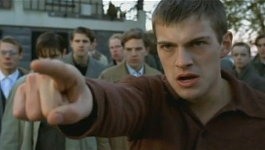
|
Ondskan (2003, Sweden) — A surprisingly good film in the boarding-school resistance-to-bullies category with a few twists, only slightly tinged by the socialism of the author of the novel on which it’s based. |
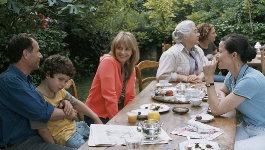
|
L’Heure d’été (2008, France) — Three siblings deal with their mother’s estate. |

|
Sink the Bismarck! (1960, Great Britain) — Cracking naval tale. A classic of the World War II genre. |
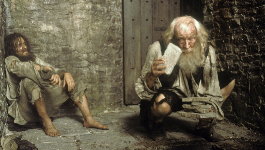
|
The Count of Monte Cristo (2002, U.S.A.) — Significant changes from the plot of the book besides the usual compression of the story line mar this film. Just not as worthwhile as the lavishly done 1998 French mini-series. |
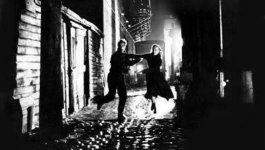
|
On the Waterfront (1954, U.S.A.) — A priest tries to convince a mob lackey to testify against his bosses to challenge their murderous and abusive control of the waterfront. Particularly intriguing as the director was brave enough to challenge Hollywood communists in the 1950s. |
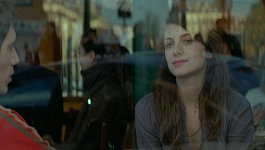
|
Paris (2008, France) — The interweaving lives of a handful of Parisians. I will see any film that has Juliette Binoche or Mélanie Laurent in it, and this film has both. Also with François Cluzet (of “Ne le dis à personne/Tell No One”) and Albert Dupontel. |
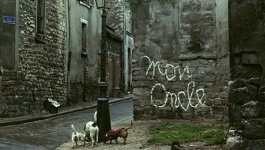
|
Mon Oncle (1958, France) — Jacques Tati’s first colour film, Monsieur Hulot continues to struggle with the postwar infatuation with modern architecture and consumerism. On its release it was condemned for its obviously reactionary world-view, but has since become a cult favourite. |
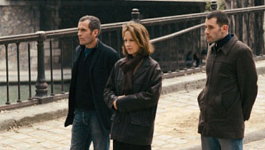
|
Le Petit Lieutenant (2005, France) — A young police recruit from the provinces joins a Parisian precinct and investigates a murder alongside his female unit commander, a recovering alcoholic. |

|
Les rivières pourpres (2000, France) — Jean Reno plays a police detective sent to a small university town in the Alps to investigate a brutal murder. Meanwhile, another detective (played by Vincent Kassel) looks into the desecration of the grave of a young girl. The plots soon become intertwined in an intriguing fashion. This film failed to live up to its potential (the university aspect could have been developed further) but is still a decent cop flick. |

|
Buongiorno, notte (2003, Italy) — The kidnapping of Aldo Moro by the Red Brigades. |
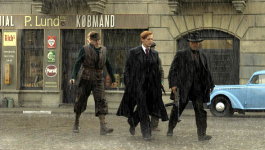
|
Flammen & Citronen (2008, Denmark) — Another good Scandinavian World-War-II resistance movie, alongside Norway’s “Max Manus” of the same year. (Previously covered here). Mads Mikkelsen (the Bond villain in “Casino Royale”) plays ‘Citronen’. |
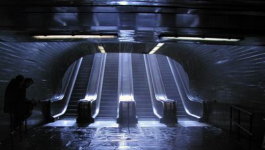
|
Kontroll (2003, Hungary) — The ticket collectors of the Budapest Metro worry about a series of mysterious platform deaths. Varies between the comic, the thrilling, and the tiresome. |
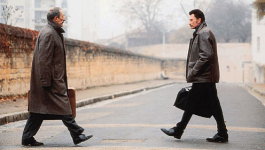
|
L’homme du train (2002, France) — A man steps off a train planning to rob a bank, but strikes up a friendship with a retired poetry teacher. Jean Rochefort and Johnny Hallyday are a surprisingly good pairing. |

|
Advise and Consent (1962, U.S.A.) — The Senate must either approve or reject the President’s nomination for Secretary of State, but plots and intrigues are afoot. Otto Preminger does Washington, and does it well. |

|
The International (2009, U.S.A.-Germany-Great Britain) — A cracking conspiracy thriller staring Clive Owen as a stubborn Interpol investigator and Naomi Watts as a Manhattan Assistant D.A. Includes a fun shoot-out in the Guggenheim. |

|
Banlieue 13 (2004, France) — Parkour-heavy action film set in a Parisian crime ghetto of the near-future. |

|
Il divo (2008, Italy) — Biographical film of the seven-time Italian prime minister Giulio Andreotti. Toni Servillo’s portrayal of the main character, however, crosses the line into caricature. |
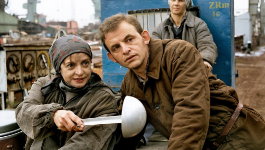
|
Strajk – Die Heldin von Danzig (2006, Germany-Poland) — A German film in Polish about the hardest-working employee at the Gdansk shipyards who finally takes a stand against the horrendous working conditions under the Communist regime. |
Interesting Things Elsewhere
Copernicus re-buried: an interesting but misleading story
Phil Lawler | catholicculture.org
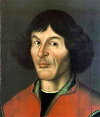 An interesting AP story is making the rounds this week, reporting that the Catholic Church has finally given due honors to Copernicus. Unfortunately the story is chock-full of statements that are severely misleading if not downright wrong. Start with the opening sentence… read more
An interesting AP story is making the rounds this week, reporting that the Catholic Church has finally given due honors to Copernicus. Unfortunately the story is chock-full of statements that are severely misleading if not downright wrong. Start with the opening sentence… read more
Britannia still rules the waves
Rian Malan | The Daily Telegraph
Natal was founded in the early 1840s by Sir Benjamin d’Urban on a stretch of elephant-infested bush. Some would say d’Urban stole the land from the Zulu kingdom, but the occupiers of record in 1843 were Boer Voortrekkers, who reloaded their ox wagons and headed back into the wild interior rather than submit to Queen Victoria. English-speaking Natalians heaved a sigh of relief and proceeded to turn their territory into a shrine to straight bats, and stiff upper lips. read more
Sarkozy’s arch rival Dominique de Villepin sets up rival party
conservativehome
 Dominique de Villepin, the eloquent opponent of the Iraq war and leader of the anti-Sarkozist centre-right in France, has set up a new political movement to bring the French right back to its sense. De Villepin used the launch to attack France’s involvement in the Afghan debacle, and Sarkozy’s decision to bring France back into the NATO military structure. ConservativeHome’s International section writes about the new movement with a sceptical eye. read more
Dominique de Villepin, the eloquent opponent of the Iraq war and leader of the anti-Sarkozist centre-right in France, has set up a new political movement to bring the French right back to its sense. De Villepin used the launch to attack France’s involvement in the Afghan debacle, and Sarkozy’s decision to bring France back into the NATO military structure. ConservativeHome’s International section writes about the new movement with a sceptical eye. read more
Amadeo Guillet
Obituary | The Daily Telegraph
 Daybreak on January 21, 1941: 250 horsemen erupted through the morning mist at Keru, cut through the 4/11th Sikhs, flanked the armoured cars of Skinner’s Horse and then galloped straight towards British brigade headquarters and the 25-pound artillery. At a distance of 25 yards they fired, cutting swathes through the galloping horses but also causing mayhem as the shells exploded amid the Sikhs and Skinner’s Horse. After a few more seconds the horsemen disappeared into the network of wadis that criss-crossed the Sudan-Eritrean lowlands. read more
Daybreak on January 21, 1941: 250 horsemen erupted through the morning mist at Keru, cut through the 4/11th Sikhs, flanked the armoured cars of Skinner’s Horse and then galloped straight towards British brigade headquarters and the 25-pound artillery. At a distance of 25 yards they fired, cutting swathes through the galloping horses but also causing mayhem as the shells exploded amid the Sikhs and Skinner’s Horse. After a few more seconds the horsemen disappeared into the network of wadis that criss-crossed the Sudan-Eritrean lowlands. read more
Are Czechs the least religious of all?
Dana Hamplová | guardian.co.uk
This claim is usually based on the sociological surveys and census data which show that only a small proportion of Czechs goes regularly to church and that most of the Czech Republic’s population does not report even a formal affiliation to any church. But the idea that Czechs are almost completely indifferent to any religion is not accurate. read more
French Intellectuals Pen ‘Appeal to Truth’ In Support of Benedict XVI
A number of prominent French men & women have written a ‘call to truth’ supporting Pope Benedict XVI in the current media storm and pedophilia scandal. As the Appeal’s about page says, Pope Benedict XVI “is the first pope to address head-on, without compromise, the problem. Paradoxically, he is the subject of undermining and personal attacks, attacks relayed with a certain complacency on the part of the press”.
The list of original signatories includes writers, essayists, literary critics, bloggers, professors, philosophers, businessmen, senators, members of parliament, mayors, publishers, actors, a Protestant minister, a Fields medal winner, and even a sexologist.
The ‘Appel à la Vérité’ is reproduced, in an unofficial English translation, below:
The cases of pedophilia in the Church are, for all Catholics, a source of profound grief and great sorrow. From members of the Church hierarchy were, in some cases, serious deficiencies and failures, and we welcome the Pope’s wish to shed light on these cases.
With the bishops, and as members of the Church, lay Catholics bear the brunt of the crimes of certain priests and failures of their superiors; they fall firmly, as Christ taught, on the side of those who suffer most from these crimes, the victims, while praying for the culprits.
As for us, we hope with all our hearts that the whole truth comes out and all in the Catholic Church that could enable these offenses brought to Christ should be discussed calmly and amicably amongst all men and women of good will.
At the same time, we regret the runaway and provocative press that accompany these cases. Beyond the legitimate & democratic right to information, we can only note with sadness, as Christians but also as citizens, that many media in our country (and in the West in general) treat these cases with bias, ignorance, or delight. Shourtcuts in generalizations, the portrait of the Church which is currently done in the press does not match the experiences of Catholic Christians.
While reiterating our horror at the crime of pedophile priests and our solidarity with the victims, we urge the media to an ethic of responsibility that would undertake a more ethical treatment of these cases. The effects of runaway media are, by far, reserved to the Church, but we are tired of and battered by this thrashing. We think of so many priests who courageously, and sometimes in solitude, bear the message of Christ.
We are with them.
We welcome the letter from the bishops of France to Pope Benedict XVI, and wish to see the Catholic Church, with serenity and responsibility, through this painful ordeal.
This appeal was launched at the initiative of François Taillandier (writer), Frigide Barjot (humourist), Natalia Trouiller (journalist & blogger), Koz (blogger & lawyer), and Francis Miclo (philosopher).
Original signatories (31 March 2010):
Jacques Arènes (pyschoanalyst and writer)
Denis Badré (senator)
Frigide Barjot (humourist)
Jean-Marc Bastière (journalist and writer)
Claude Bébéar (honorary president of AXA)
Michel Boyancé (Dean of the Institut de France and comparative philosopher)
Rémi Brague (philosopher, member of the Institut de France)
Alexis Brézet (journalist)
Jean des Cars (writer)
François Cassingena-Trévedy (Benedictine monk, liturgist and writer)
Jean Chélini (historian, permanent secretary of the Académie de Marseille)
Ghislain du Chéné (international coordinator of Foi et Lumière)
Colette Combe (pscyhoanalyst and writer),
François Content (Director-General of the Fondation d’Auteuil)
Philippe Delaroche (writer, journalist)
Chantal Delsol (writer and philosopher)
Patrick Demouy (historian, university professor)
Bernadette Dupont (senator)
Bertrand d’Esparron (corporate communications manager)
Emmanuel Falque (philosophee and writer)
Olivier Florant (sexologist)
Jean-Christophe Fromantin (mayor of Neuilly-sur-Seine, businessman)
Réginald Gaillard (Editions de Corlevour)
Patrick de Gméline (historian)
Samuel Grzybowski (President/founder of the association Coexister)
Fabrice Hadjadj (essayist and playwright)
Rona Hartner (singer, actress)
François Huguenin (writer)
Vincent Hervouët (journalist)
Yvon Jacob (chief executive, former member of parliament)
Gaspard-Marie Janvier (writer)
Pasteur Alain Joly (Lutheran Church)
Patrick Kéchichian (writer and literary critic)
Koz (blogger and lawyer)
Louis-Etienne de Labarthe (editor-in-chief, Il est vivant)
Philippe de Lachapelle (director of the OCH)
Laurent Lafforgue (mathematician, winner of the Fields medal)
Gérard Leclerc (essayist, journalist)
Henrik Lindell (journalist)
Michael Lonsdale (actor)
Victor Loupan (editor, La Pensée Russe)
Jean-Baptiste Maillard (journalist, essayist)
Bruno Maillé (teacher, essayist)
François Maillot (Director-General, La Procure)
Jean-Luc Marion (philosopher, member of the Académie Française)
Jean-Pierre Marcon (member of parliament)
Nicolas Mathey (Professor of Law, Université de Paris V)
Jean-Pierre Machelon (Professor of Law, Université de Paris V)
Marc Mennessier (journalist)
François Miclo (philosopher)
Jean-Marc Nesme (member of parliament & mayor)
Philippe Oswald (journalist)
Xavier Patier (writer)
Patrice de Plunkett (writer and blogger)
Hugues Portelli (senator)
Jean-Frédéric Poisson (member of parliament)
Aymeric Pourbaix (journalist)
Guillaume de Prémare (communications consultant, Médias & Evangile)
Edmond Prochain (blogger, journalist)
Samuel Pruvot (journalist)
Jacques Rémiller (member of parliament & mayor)
Alina Reyes (writer)
Damien Ricour (actor)
Ivan Rioufol (essayist, journalist)
Catherine Rouvier (jurist, political scientist)
Jean Sévillia (journalist, writer)
Grégory Solari (editor)
Raphaël Stainville (journalist)
Denis Sureau (editor, theologian)
François Taillandier (writer)
Denis Tillinac (writer)
Henri Tincq (journalist and writer)
Hubert de Torcy (editor-in-chief, L’1visible)
Vincent Trémolet de Villers (journalist)
Natalia Trouiller (blogger, journalist)
Didier Truchet (Professor of Law, Université de Paris II)
Patrick Tudoret (writer)
Christian Vanneste (member of parliament)
François de Wendel (business executive)
La mort de la Librairie Française
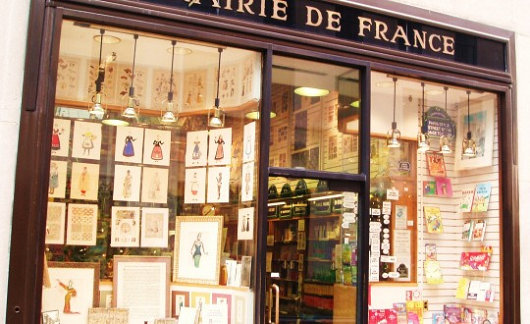
Among the unfortunate recent victims of Manhattan’s extortionately exorbitant rents is the Librairie Française. Last year the venerable New York institution had its rent raised from $360,000 to $1 million per year. The shop was founded in 1928 by Isaac Molho a Sephardic Jew from Salonika, who was invited by David Rockefeller himself to rent a space on the Promenade in Rockefeller Center in 1935. The Maison Française, in which the Librairie was located, flanked the south side of the Promenade, with the British Empire Building flanking the north — the bit of greenery in-between is called ‘Channel Gardens’ accordingly. The sign on the façade said ‘Librairie de France’ but in conversation I have never heard it referred to as anything other than the Librairie Française.
During the Second World War, the shop also operated a publishing house called La Maison Française that printed Gaullist propaganda as well as titles by French writers like Jacques Maritain, André Maurois, Jules Romains, and Antoine de Saint-Exupéry. It was the post-war period, however, in which the Librairie Française flourished. (more…)
“Lourdes”
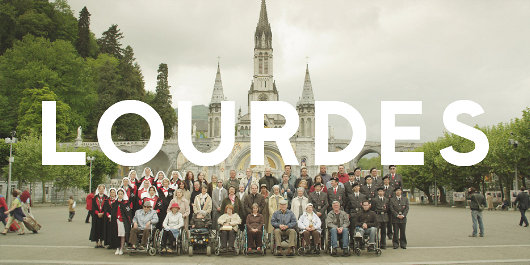
Various sources have brought to light the new film “Lourdes” by the Austrian director Jessica Hausner. The film depicts the pilgrimage to Lourdes of a non-particularly religious woman (played by Sylvie Testud) suffering from Mutiple Sclerosis who is healed of her illness. The film by a non-believing director has met with both praise and suspicion from Catholic quarters, and has been compared, at least stylistically, to the work of Michael Haneke (whose latest, “The White Ribbon” is currently showing in New York). Latest to weigh in is the Catholic Herald‘s indispensable Anna Arco, who writes:
I saw it as an exercise in theodicy where God loses. In a quiet dispassionate way, Jessica Hausner, the film’s Austrian director, paints a bleak picture of a world where fate is a blind, arbitrary force and human beings clutch at the straws of faith, half-truths in their cowardly despair. The suffering are not healed, human nature is selfish and the problem of pain is not solved. God can’t exist because he isn’t fair. Christianity offers a web of half-truths obscuring a nihilistic reality.
Miss Arco recently spoke with the director, and the interview will be published in the next Catholic Herald. (more…)
Brothers Aboard the Ship of State
The Viscount Philippe de Villiers is an MEP, sometime French presidential candidate, and head of the Mouvement pour la France but his brother, General Pierre de Villiers, has just been named personal Chief of Staff to the President of the Republic (whose name we refrain from mentioning, lest we feel compelled to boo and hiss). Given this recent appointment, we reckon that General de Villiers outranks his brother in the grand apparatus of state; Chef d’etat-major particulier beats President of the General Council of the Vendée.
There is, however, at least one regard in which the civilian has his military brother beat: Pierre only has six children, Philippe has seven.
“Nothing between the insulting and the superlative…”
« In the restaurant on the Rue Saint-Augustin, M. Mirande would dazzle his juniors, French and American, by dispatching a lunch of raw Bayonne ham and fresh figs, a hot sausage in crust, spindles of filleted pike in a rich rose sauce Nantua, a leg of lamb larded with anchovies, artichokes on a pedestal of foie gras, and four or five kinds of cheese, with a good bottle of Bordeaux and one of champagne, after which he would call for the Armagnac and remind Madame to have ready for dinner the larks and ortolans she had promised him, with a few langoustes and a turbot — and, of course, a fine civet made from the marcassin, or young wild boar, that the lover of the leading lady in his current production had sent up from his estate in the Sologne.
“And while I think of it,” I once heard him say, “we haven’t had any woodcock for days, or truffles baked in the ashes, and the cellar is becoming a disgrace — no more ’34s and hardly any ’37s. Last week, I had to offer my publisher a bottle that was far too good for him, simply because there was nothing between the insulting and the superlative.” »
Chartres 2009
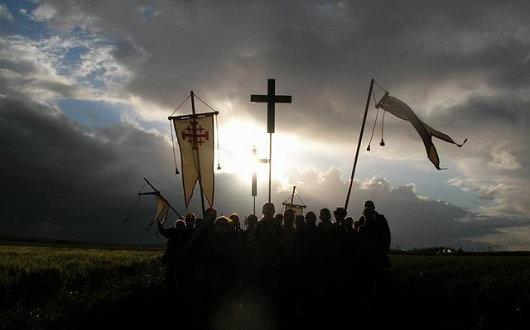
While there are but a few days to go, I can’t let this year depart without finally showing you photos of the 2009 Paris-Chartres pilgrimage which takes place every year on the weekend of Pentecost. (See 2008, 2005, 2004). The theme for the upcoming 28th Pilgrimage from Notre-Dame de Paris to Notre-Dame de Chartres was recently announced by the Association Notre-Dame de Chrétienté which organises the event. The 28th Pilgrimage will take place on the 22nd, 23rd, and 24th of May 2010, with the theme “The Church is Our Mother”. The themes for the individual days will be: 1) Teaching, under the patronage of St. Peter; 2) Sanctifying, under the patronage of St. Jean Vianney, the Curé d’Ars; 3) Governing, under the patronage of St. Pius X.
The following photos, however, are compiled from various sources, and show the pilgrimage which took place this past Pentecost. (more…)
« Sans la liberté de blâmer, il n’est point d’éloge flatteur »
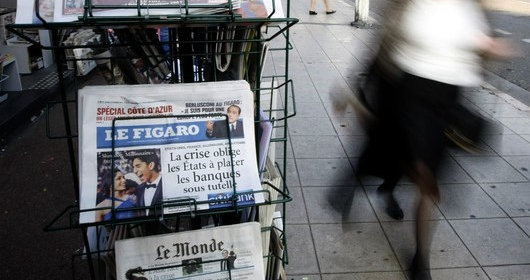
I‘m sure I’m not the only one whose information-gathering habits have changed for the worse since Le Figaro started charging for access to their online digital version. I much prefer flipping through digital “e-paper” versions to trying to sort through a newspaper’s actual website. When you flip through a laid-out newspaper, you get an overall picture of news and information as the editors have sought to present it to you. On websites, it’s all too easy to ignore all but that which you click on. I was about to complain that Le Figaro‘s change means I will no longer be able to stumble upon interesting articles on Romanian restitution cases and a bold Hungarian countess, but in truth those were from the days when I tended to pick up the actual printed edition rather than flip through it online.
Whiskey Tango Foxtrot
Followers of recent news in right-wing French politics will be able to decipher this text message:
I hope to share more thoughts on this controversial subject when I get back to New York in September, but I’m busy settling my affairs in Africa this week, then hunkering through Edinburgh & London the following weeks, before I return to the glories of uncapped internet access. Until then, it can be followed in French at Le Salon Beige, among other blogs.
Le Pape à Paris
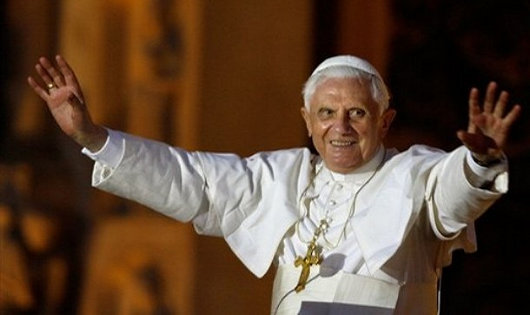
While Benedict XVI is currently in the headlines for his visit to the Holy Land, here is a translation into French by Béatrice Bohly of my piece on Benedict’s visit to Paris last year.
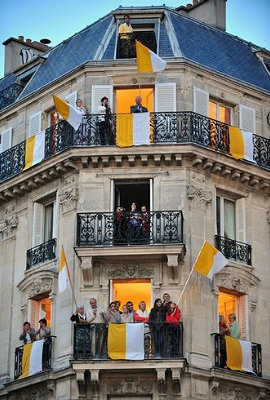 La devise de la ville de Paris, Fluctuat nec mergitur est parfaitement appropriée: « Battue par les flots, elle ne sombre pas ». Difficile de trouver des mots plus aptes à décrire la barque de Pierre, dont le Saint-Père, le pape, a passé ces deux jours dans la capitale française. Depuis des temps immémoriaux, la France a été considérée comme « la fille aînée de l’Eglise », son siège de primauté de Lyon ayant été établi au cours du deuxième siècle et Clovis, son premier roi chrétien, ayant reçu le baptême en 498. Mais à côté de 1.500 ans de christianisme, au cours des deux derniers siècles, la France, a également servi de fonds baptismaux à la révolution et à la rupture – dans l’esprit-même de ce premier “non serviam” (phrase attribuée à Lucifer, refusant de servir Dieu, ndt) .
La devise de la ville de Paris, Fluctuat nec mergitur est parfaitement appropriée: « Battue par les flots, elle ne sombre pas ». Difficile de trouver des mots plus aptes à décrire la barque de Pierre, dont le Saint-Père, le pape, a passé ces deux jours dans la capitale française. Depuis des temps immémoriaux, la France a été considérée comme « la fille aînée de l’Eglise », son siège de primauté de Lyon ayant été établi au cours du deuxième siècle et Clovis, son premier roi chrétien, ayant reçu le baptême en 498. Mais à côté de 1.500 ans de christianisme, au cours des deux derniers siècles, la France, a également servi de fonds baptismaux à la révolution et à la rupture – dans l’esprit-même de ce premier “non serviam” (phrase attribuée à Lucifer, refusant de servir Dieu, ndt) .
Ce fut le penseur français Charles Maurras – lui-même non-catholique jusqu’à la fin de sa vie – qui a conçu de la notion que (depuis la révolution) il n’y avait pas une France mais deux : le pays réel et le le pays légal. La vraie France, catholique et droite, contre la France officielle, irreligieuse et artificielle. Tout comme Maurras différenciait les deux visions de la France, nous, dans le monde d’expression anglaise, savons que l’Angleterre est vraiment un pays catholique qui souffre d’un interregnum de quatre-siècle (de même que l’Ecosse, et l’Irlande, et l’Amérique, et le Canada, et l’Australie…). Nous aimons nos patries mais nous savons qu’elles ne sont pas vraiment elles-mêmes – elles ne reflètent pas vraiment cette idée de leur essence – jusqu’à ce qu’elles jouissent de la plénitude de la communion chrétienne.
Un soupçon de couleur
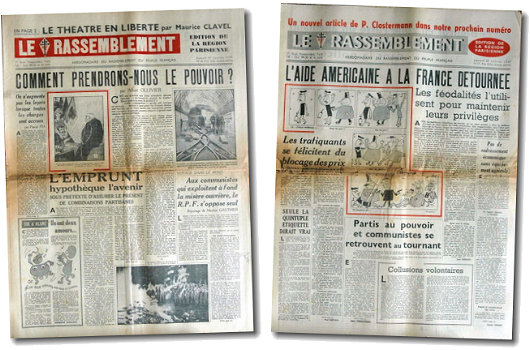
These two numbers of the Gaullist newspaper Le Rassemblement show what even a little dose of colour can do for a journal printed in black-and-white. The lack of additional colour was due to economical, not to mention technological, restraints, but we have now gotten well used to our newspapers being printed in a full array of colour. Yes, even the FAZ.
The Badge of the Cincinnati
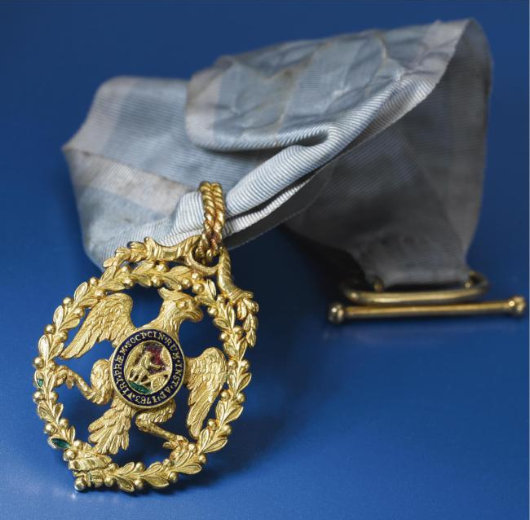
George Washington’s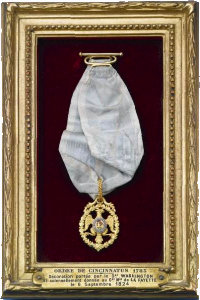 Society of the Cincinnati medal was auctioned off at Sotheby’s last year for a whopping $5,305,000. Founded by General Washington and other officers of the Continental and French armies who served in the American Revolution, the Society of the Cincinnati is the oldest and most prestigious of America’s many hereditary societies.
Society of the Cincinnati medal was auctioned off at Sotheby’s last year for a whopping $5,305,000. Founded by General Washington and other officers of the Continental and French armies who served in the American Revolution, the Society of the Cincinnati is the oldest and most prestigious of America’s many hereditary societies.
Louis XVI was himself a member, and the Society was known as the ordre de Cincinnatus in France, where it was added to the hierarchy of orders (even though it was not, strictly speaking, an order) as ranking just below the Order of Saint Louis.
General Washington’s Cincinnati badge was, after his death, given to the Marquis de Lafayette whose descendants kept it in the family until the auction last December.
The Pope in Paris
Benedict XVI brings a message of love & hope to the City of Light

 It is wholly appropriate that the motto of the city of Paris is Fluctuat nec mergitur: “Tossed by waves, she does not sink”. It would be hard to find better words to describe the Barque of Peter, whose Holy Father the Pope has spent the past two days in the French capital. From time immemorial, France has been described as “the eldest daughter of the Church”, its primatial see of Lyons established in the second century and Clovis, its first Christian king, receiving baptism in 498. But alongside the 1,500 years of Christianity, France has, for the past two centuries, also been a font of revolution and disruption — the very spirit of that first “non serviam“.
It is wholly appropriate that the motto of the city of Paris is Fluctuat nec mergitur: “Tossed by waves, she does not sink”. It would be hard to find better words to describe the Barque of Peter, whose Holy Father the Pope has spent the past two days in the French capital. From time immemorial, France has been described as “the eldest daughter of the Church”, its primatial see of Lyons established in the second century and Clovis, its first Christian king, receiving baptism in 498. But alongside the 1,500 years of Christianity, France has, for the past two centuries, also been a font of revolution and disruption — the very spirit of that first “non serviam“.
It was the French thinker Charles Maurras — not himself a Catholic until the very end of his life — who conceived of the notion that (since the Revolution) there was not one France but two: le pays réel and le pays legal; The real France, Catholic and true, versus the official France, irreligious and contrived. Just as Maurras differentiated the two visions of France, we in the English-speaking world know that England is truly a Catholic country that is suffering from a four-century interregnum (and so with Scotland, and Ireland, and America, and Canada, and Australia…). We love our homes but we know they are not truly themselves — they do not truly reflect that idea of their essence — until they enjoy the fullness of Christian communion.
Fire at St. Jodard
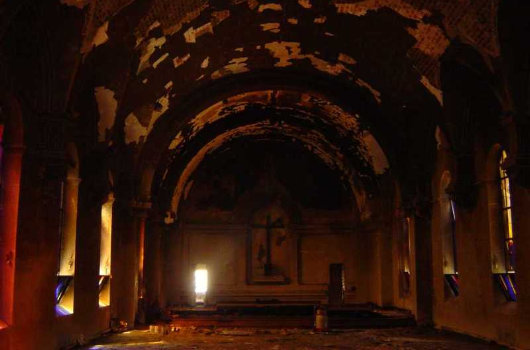
The chapel of the Community of St. Jean’s novitiate at Saint-Jodard in France was tragically consumed by an accidental fire late last month. The brothers give thanks that no one was harmed in the fire and look upon the event as “a favorable occasion to learn how to live together in the Great Hope and to redouble fraternal charity”.
Contributions can be sent to:
Prieuré Saint Joseph
42590 St Jodard
FRANCE
What was that you were saying about “cheese-eating surrender monkeys”?
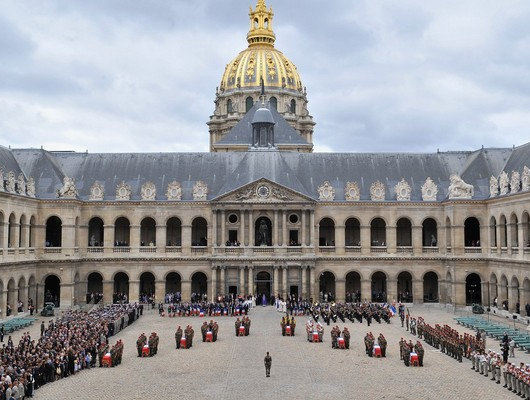
Yann Baly writes:
“Regarding the sacrifice of the 10 young French soldiers killed in combat in Afghanistan, we have heard many voices, including those of the families of the young parachutists, saying that they died for nothing.
“Politicians are duty-bound to question the timeliness of our engagement in Afghanistan under NATO command, in a war desired by the United States. We cannot remain silent when France, and French youth have, in the past, paid too heavy a price because of “sacred” unions in wars that diplomacy and sensible politics could have avoided.
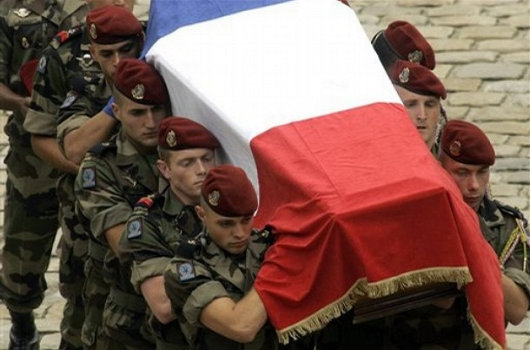
“Yesterday, in the majestic courtyard of les Invalides, the French people were able to recall that certain political errors are paid for in blood. It is therefore legitimate to wonder if Jacques Chirac (who was not present yesterday) and Lionel Jospin were right to send the French army into Afghanistan in 2001 and if Nicolas Sarkozy was not wrong to reenforce the contingent with the inadequate means we are all aware of. As Bernard Antony has reminded us, the United States has committed so many errors of foreign policy, so many criminal mistakes in its diplomatic and military actions, that one can doubt the need to be present in Afghanistan. History shows us that economic and oil interests have often been a decisive element in the American involvement in military conflicts. Fight efficiently against terrorism? There too, there are questions to be asked.
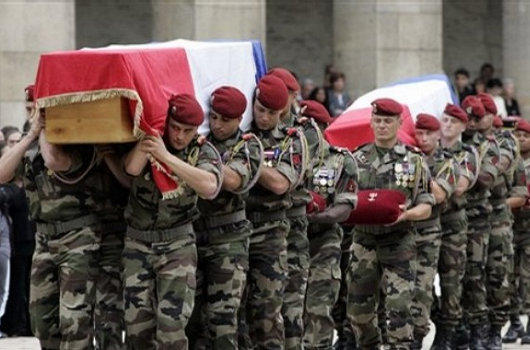
“Nonetheless, it is false to say that our young parachutists died for nothing. First of all, the French people have become conscious once again that they had an army. A month and a half after the tragedy in Carcassonne, the blood of these soldiers has washed away the lies, insults and spite, some of it coming from the head of State himself, heaped on the French army. But most of all, in our society where egoism and individualism are the rule, for a people who seem to have forgotten the meaning of sacrifice, their death in combat, at the age of 20 for most of them, is no doubt a sign of an imminent resurrection of the spirit of French resistance. In the current international and national context, this dimension is not insignificant. France, like the rest of the world, is entering into a period of uncertainties and grave risks. To be conscious of that and to prepare for it is not nothing.”
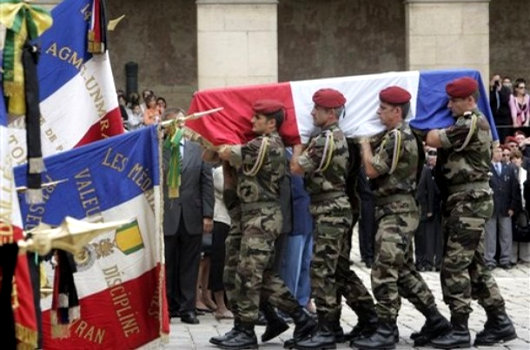
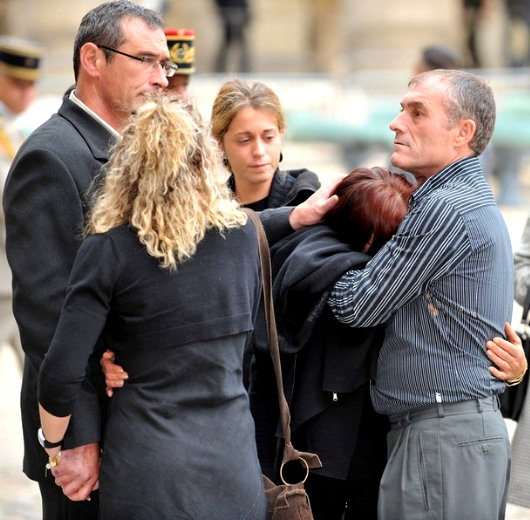
Search
Instagram: @andcusack
Click here for my Instagram photos.Most Recent Posts
- Amsterdam November 26, 2024
- Silver Jubilee November 21, 2024
- Articles of Note: 11 November 2024 November 11, 2024
- Why do you read? November 5, 2024
- India November 4, 2024
Most Recent Comments
Book Wishlist
Monthly Archives
Categories

